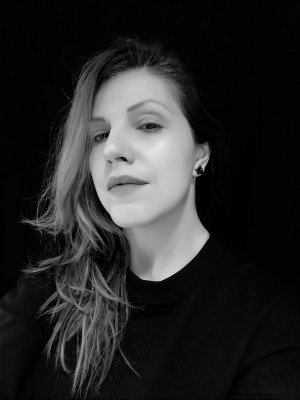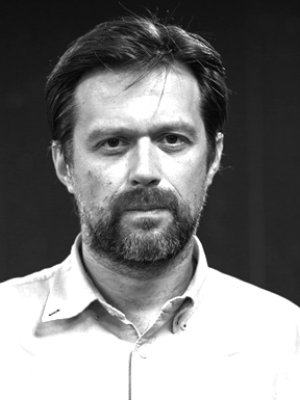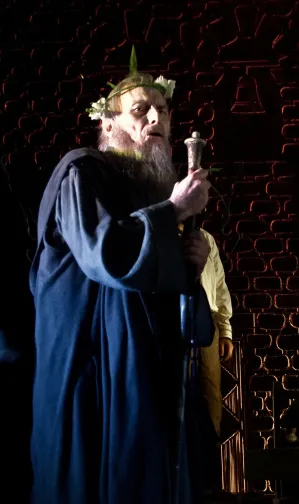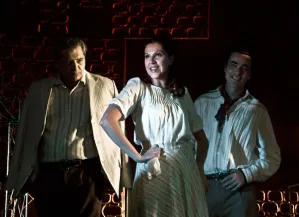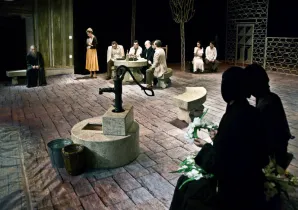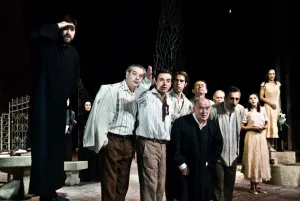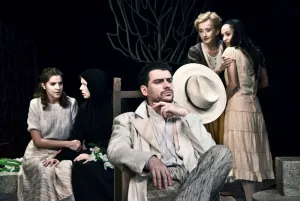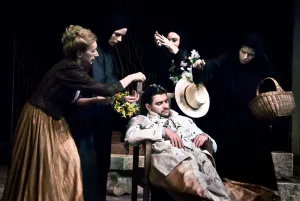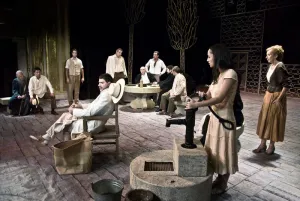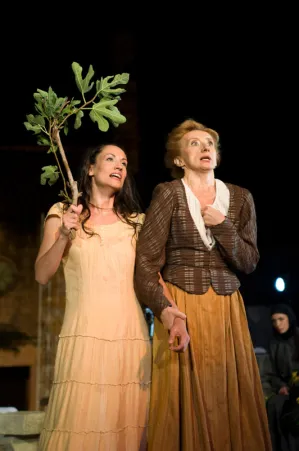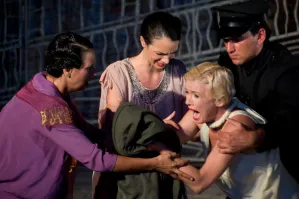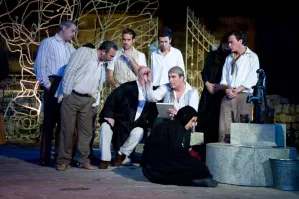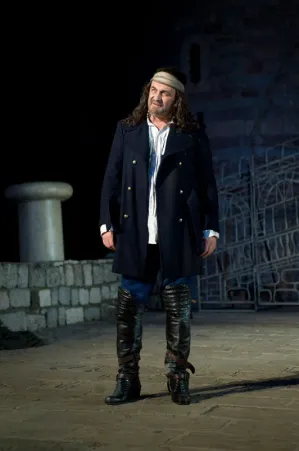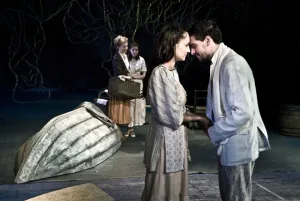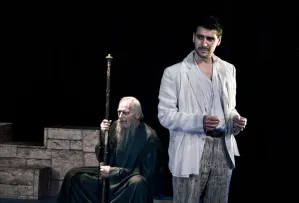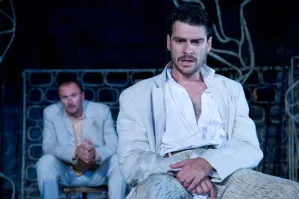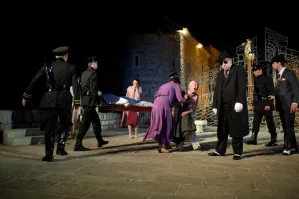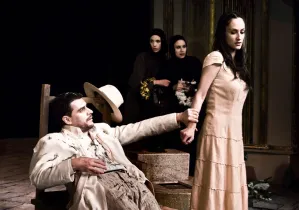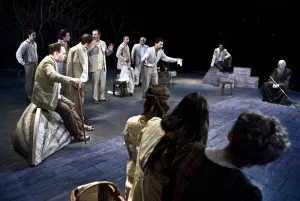Kanjoš Macedonović
drama by Vida Ognjenović

Note from the dramaturge Božo Koprivica
KANJOŠ MACEDONOVIC, WE WISH YOU LUCK IN THE NEW LIFE!
(…) In all three dramas connected to the Paštrovićs - Kanjoš Macedonović, Jegor’s Road and Don Krsto, Vida Ognjenović captures the tone and dialect of Montenegrin seaside, in a way that represents a true rarity. In a way, dramas by Vida Ognjenović achieve a distance (everything has been elevated at one meter high from the ground), and then, everything seems authentic. There is sincerity, we believe in what a character says. I am confident that the language will provide for long stage lives of these plays. (...)
World premiere of Vida Ognjenović’s Kanjoš Macedonović in Budva, in summer of 1989, was produced as an epoch, as the time of the legend of Kanjoš Macedonović. In environment, costumes and in rhythm. (...)
In the new production, Vida Ognjenović moves the plot in the period between the two world wars. Thus, the relationship between the Paštrovićs and Venetians, little ones and big ones, could be interpreted as stripping the coating of gold from epic understanding of history. From the lamenting concept of history. “Luka, it will be heroic and pride worthy! We will mourn after you beautifully! Each and every one of us will visit your grave when we come to Venice! Kanjoš: I’m afraid you wouldn’t be able to find it…” (...)
In the new life of Kanjoš Macedonović, from the opening scenes we witness claustrophobia, cruelty of confined society towards all those who try to play their game, to disobey parts of social and religious laws. (…) In the drama, we see a confrontation between characters who tend to overstep limits (Daskale, Vukac, Vidosava, Ivka, Stevan, Rade, Father Filimon) and those who stand guard to the rules with their status, tradition, rigidness, retaliation (Stijepo, Katna, Father Gerasim...). (...)
Kanjoš experiences love as shame, as uneasiness, as witchcraft, as melodrama and as eroticism. Love games are written with superb skill (Kanjoš would make an excellent screenplay for a film). (…) Unreturned, suppressed love leads to self-destruction, the wish for self-destruction comes from restraints to show emotion in an epic environment. The only defence from self-destruction is a carnival. The vortex of irrational, extraordinary, represents one of the most beautiful scenes in the new Kanjoš. Kanjoš, as a musical, as the midsummer’s night. (…)
This piece by Vida Ognjenović reveals its secret in the dialogue between Furlan and Kanjoš. The secret of a tragic misunderstanding between David and Goliath. Only, in this case, Kanjoš is David, a mercenary, hired assassin, while Furlan is Goliath, seasoned sailor who has “conquered cities by his spear” for the Doge, he is the one who recognizes the arrival and mechanism of upcoming fascism. (…)
Love chorus: Ivka-Kanjoš and Furlan-Doge’s Daughter in 3rd act brings in the elements of melodrama, as in other Vida Ognjenović’s dramas. Nobility and melancholy. In such circumstances, fascism becomes even more obvious, it seems increasingly cruel and crude. Tremendous importance is in the story of lack of recognition, of indifference, regarding fascism that grows like a cancer. Moreover, it grinds our lives. New Kanjoš as the final warning. And defence and(or) last days. Time for new idols. The world has changed so much, it tilted towards evil, malice and wrong, that even tomorrow, everything could disappear if we do not stand tall. The language of fascism gaining momentum is squealing, mumbling and talking nonsense, belching while singing. A group consists of cashiers, conductors, literary classics, scholars. Behold the language, the richness of language in Kanjoš Macedonović by Vida Ognjenović! Therefore, at times, just close your eyes and listen. Listen and observe, because Kanjoš portrays certain disappearing concepts: victim, shame, friendship, love. Let us reinstate shame, as an aesthetic category and that will make an immense step forward. The first step. (…)
Legend about Kanjoš and his achievement in new history, has been transformed into a legend about a pigeon breeder. Nowadays, it is a sign of Venetian charity and kindness. Fascism strives to represent death camps as places of mercy, or as places that never existed. New Kanjoš faces the fascism with humour, melody of language, beauty. Kanjoš set off for Venice and arrived just before Easter, at the most beautiful time of year.
The most beautiful time of year in Belgrade is October (…) and we wish you luck in your new life, Kanjoš Macedonović! (...)
 VIDA OGNJENOVIĆ
VIDA OGNJENOVIĆ
Vida Ognjenović was born in Dubočke near Nikšić, grew up and went to school in Vojvodina and Serbia. She finished elementary school in Vrbas and grammar school in Sremski Karlovci. She graduated from Literature Department at the Faculty of Philology in Belgrade and from Directing Department at Belgrade Academy of Theatre, Film and TV. She began her postgraduate studies at Sorbonne in Paris and received her Master’s Degree at the University of Minnesota, USA (1972). She worked as an assistant at the Faculty of Dramatic Arts in Belgrade from 1974 until 1979. In 1977, she was nominated Head of the Drama of the National Theatre in Belgrade and after that stayed as a director in that same theatre. As a visiting professor, she taught at Universities in Los Angeles (UCLA, 1981-1982), Chicago (UIC, 1997-1998). On her lecturing tours, she visited all the major Universities in the USA (1985, 1991, 1997, 1999). She holds tenure as a professor at the Academy of Art in Novi Sad. Ognjenović directed close to a hundred of theatre, TV and radio productions, many of which were her original plays. She wrote twelve dramas, which were produced and performed many times, and published by different publishing houses, in addition she wrote many successful dramatisations. As a director, she was a guest in many theatres throughout former Yugoslavia (Montenegro, Slovenia, Croatia) and also put up various productions abroad. She directed varied repertoire of plays, including Yugoslav and foreign classics as well as contemporary dramas, out of which many were world premieres.
Awards for achievements in theatre
For her work she received all the significant theatre awards: two Sterija Awards for the best text (Was there Prince’s dinner?, 1991; Jegor’s Road, 2001); Sterija Award for directing (Jegor’s Road, 2001); Sterija Award for dramatisation (Root, Trunk and Epilogue, 1984); October Award of the City of Belgrade for directing (Mephisto, 1984); Golden Wreath of the Festival in Sarajevo for directing (Mephisto, 1985); “Joakim Vujić” Award for the text (How to Make Master Laugh, 1998); Golden Turkey Award for directing (How to Make Master Laugh, 1986); Golden Turkey Award for the best text (How to Make Master Laugh, 1986); Award of Festival of Vojvodina Theatres (How to Make Master Laugh, 1988); Award of the Cultural Association of Belgrade for directing (Migrations, 1986); ”Joakim Vujić” Award for theatrical play (1999), Award of Vuk’s Art Foundation (Was there Prince’s dinner?, 1990); Award from the Budva City Theatre for dramatic work (2007).
Literary career
Ognjenović has published ten books of prose: short stories The Poisonous Dandelion Milk (Prosveta, Belgrade, 1994); An Old Clock (Prosveta, Belgrade, 1996); Best Stories of Vida Ognjenović (Prosveta, Belgrade, 2001); The Right Address (Dnevnik, Novi Sad, 2007). She wrote three novels: A House of Dead Scents (Prosveta, Belgrade, 1995), Adulterers (Stubovi kulture, Belgrade, 2006) and The Bird Watcher (Arhipelag, Belgrade, 2010); a book of essays: Contrary to the Prophecy (Arhipelag, Belgrade, 2008); a book of travelling accounts A Travel into Travelling Report (Biblioteka, Zrenjanin, 2005); a collection of interviews No More Gullible Questions (Dnevnik, Novi Sad); eight dramas: Melancholic dramas (SKZ, Belgrade, 1991), A Girl with Dark Blue Hair (Ars Dramatica, Belgrade, 1994), Mournful Comedies (SKZ, Belgrade, 1994), Mileva Einstein (in Serbian and English), collected dramas in three books Drama I, II, III (Stubovi kulture, 2000, 2001, 2002), Kanjoš Macedonović (Oktoih, Podgorica, 1989), Jegor’s Road (Oktoih, Podgorica, 2000) and Don Krsto (Oktoih, Podgorica).
Literary awards
She also received many significant literary awards: Prosveta Award for the book of the year (1994), Andrić Award for a story (1995), Branko Ćopić Award for prose text (1996), Laza Kostić Award for a novel (1996), Karolj Sirmai Award for stories (1996), Paja Marković Adamov Award for prose (1997), Ramonda Serbica Award for prose (1998), Stefan Mitrov Ljubiša Award for Literature (1999), Award from the National Library of Serbia for the book of the year (Adulterers, 2006). Her prose and dramas were translated into English, French, Hungarian, Greek, German, Macedonian, Bulgarian, Norwegian and other European languages. She served as the Yugoslav (later Serbian and Montenegrin) Ambassador to Norway. Currently, she holds the post of Serbian Ambassador to Denmark.
Premiere performance
Premieres: 8 July 2011 in Budva | Stage inbetween the Churches
22 October 2011 | National Theatre in Belgrade | Main Stage
PRODUCTION OF NATIONAL THEATRE IN BELGRADE & THEATRE CITY BUDVA
Director Vida Ognjenović
Dramaturge Božo Koprivica
Set Designer Miodrag Tabački
Costume Designer Ljiljana Dragović
Stage Speech Instructor Radovan Knežević
Composer Zoran Erić
Stage Movements Saša Krga
Producers Borislav Balać, Marko Kentera
Premiere Cast:
Kanjoš, short of stature, walks briskly, observes wisely Igor Đorđević
Furlan, dishonoured boat commander, an outlaw Branislav Lečić
The Doge, Francesco Foscari Predrag Ejdus
Stijepo, judge and a man of reputation Branko Jerinić
Dascale, icon painter Marko Baćović
Father Gerasim, travelling monk Tanasije Uzunović
Katna, Ivka’s stepmother, a reputable matron Stela Ćetković
Ivka, sometimes a bee, sometimes a wasp, has cast a spell on Kanjoš Zorana Bećić
Vidosava, Golub’s beautiful daughter, kidnapped by Vukac Sena Đorović
Giovanna Grazia Foskari, daughter of the Doge Jelena Helc
Signora de Dolci, her chaperon Biljana Đurović
Signorina de Dolci, friend to Doge’s daughter Marta Ćeranić
Nikodim, known by the name of Darkodim Aleksandar Đurica
Luka, more cunning than both Golub and fox Branko Vidaković
Mitar, quick-witted, always with a maxim at the ready Zoran Ćosić
Golub, mild and cunning, just like his name (Pigeon) Radovan Miljanić
Krsto, a summoner of a strong voice Nebojša Kundačina
Rade, eager to travel and experience the world Siniša Ubović
Father Filimon, monk, scribe and teacher Hadži Nenad Maričić
Druško di Kataro, interpreter, spy, sentinel, etc. Andreja Maričić
Vukac, the handsomest, but nonetheless brave Pavle Jerinić
Stevan, angry and easily irritated member of Andrović family Milivoje-Mišo Obradović
Nikolo Diedo, Captain of the Guard Milo Lekić
Rector Andrea di Molin Stevan Piale
A novice Vojislav Obradović
Sentinels: Bojan Penčić, Milan Šavija, Bojan Antonijević
Bodyguards: Saša Tanasković, Nemanja Konstantinović
Producers Nemanja Konstantinović, Marko Radoman
Stage Manager Saša Tanasković
Prompter Gordana Perovski
Assistant Director Bojana Lazić
Assistant Costume Designer Aleksandra Stošić
Make-Up Master Dragoljub Jeremić
Stage Master Nevenko Radanović
Lighting Master Miodrag Milivojević
Sound Master Tihomir Savić
SETS AND COSTUMES WERE MANUFACTURED IN THE WORKSHOPS OF NATIONAL THEATRE IN BELGRADE



